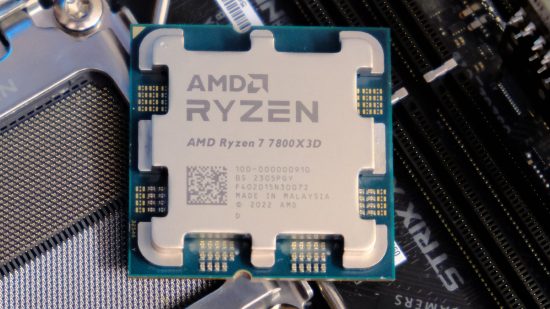Our Verdict
90%Chart-topping gaming performance makes the AMD Ryzen 7 7800X3D the best CPU for gaming and much more besides.
The AMD Ryzen 7 7800X3D is the cheapest of AMD’s Zen 4 gaming CPU lineup to be equipped with 3D V-Cache. This is an extra portion of cache stacked on top of the CPU die, which reduces latency and in turn gives you faster frame rates in games. In fact, it’s the fastest CPU we’ve ever tested in some of our game benchmarks.
The downside is that AMD has reduced this CPU’s boost clock speeds, so in situations that don’t benefit from the extra cache, it can be slower than cheaper models. As a pure gaming CPU, though, it can be faster than the Intel Core i9-13900K in many titles and also draws a huge amount less power.
At Custom PC, we’ve been reviewing the latest CPUs since 2003, and we’ve tested and overclocked hundreds of CPUs, going right back to the Pentium 4 and Athlon XP era. We’ve developed an expert testing methodology that covers all the key areas of performance, including single-threaded and multi-threaded performance, as well as gaming.
Our benchmarks include our very own RealBench suite, which has a Handbrake H.264 video encoding test to gauge multi-threaded performance, as well as multi-tasking tests. We also now run an Adobe Photoshop benchmark using Procyon, which also tests with Lightroom.
We also use the single and multi-threaded tests in Cinebench, and we test gaming performance with Far Cry 6, Forza Horizon 5, and Watch Dogs: Legion. For our game tests, we record the 99th percentile and average frame rates, and finally, we also measure the idle and load total system power draw at the wall while running Prime95’s smallest FFT test with AVX disabled. For a full rundown of our CPU testing procedure, check out our How we test page.
AMD’s original Ryzen 7000 series of CPUs launched back in 2022, but there was always the promise of game-boosting models with 3D V-Cache in the pipeline. AMD has also deliberately kept the best till last with the Ryzen 7 7800X3D, which costs less than the other 3D V-Cache models – the Ryzen 9 7950X3D and 7900X3D – but also has other advantages over those models.
The 3D V-Cache is a 64MB portion of cache stacked on top of the existing 32MB cache on a Core Complex Die (CCD). This gives the Ryzen 7 7800X3D a huge 96MB of L3 cache, which is 50 percent more than even the Ryzen 9 7950X.
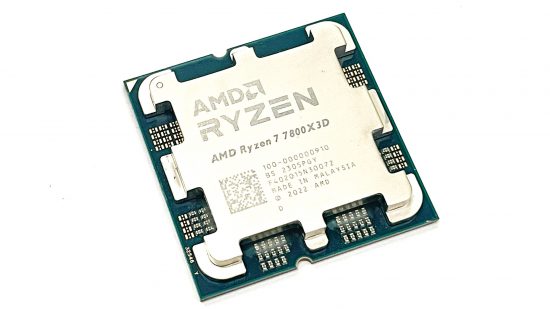
The advantage of this cache is reducing latency. The fastest way for your CPU to access data is to hold it in its own memory, known as cache. When this is full, it has to check your PC’s RAM, which increases the time it takes to access the data.
By enlarging the cache available on the CPU die, you reduce the CPU’s need to access system memory, which can drastically reduce latency. This in turn can boost performance in many games. The Ryzen 7 7800X3D has an advantage over the Ryzen 9 X3D models as it only has a single Core Complex Die (CCD), containing eight cores and a stack of 3D V-Cache.
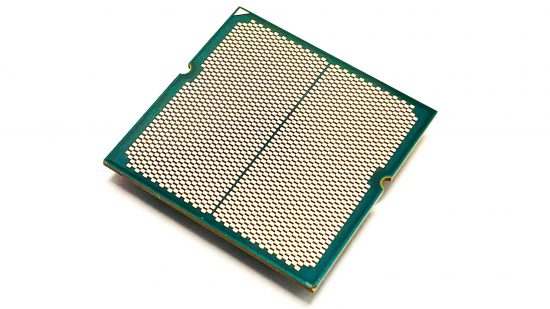
The other two CPUs have one of those CCDs, but also another CCD without any V-Cache. This setup relies on core parking and Windows’ ability to identify cores with direct access to V-Cache, which is proving a little hit-and-miss.
As a result, the 7800X3D is not just more consistent than the other X3D chips when it comes to performance, but it’s actually faster than the other models in some games, despite only having a boost clock of 5GHz, compared with 5.7GHz for the top-end Ryzen 9 7950X3D. Its direct competitors in terms of price are the Ryzen 9 7900X and Core i7-13700K.
Ryzen 7 7800X3D application performance
Our heavily multi-threaded Handbrake video encoding test saw the first evidence of situations where the extra cache of the Ryzen 7 7800X3D fails to make up for its comparative lack of clock speed and cores. The Ryzen 7 7800X3D languished at the bottom of the graph, with a lower result than even the cheaper Ryzen 7 7700X. Meanwhile, the Core i7-13700K was nearly 40 percent faster than the 7800X3D.
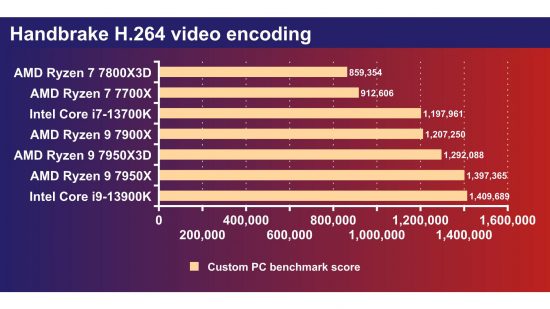
The 3D V-Cache did make the Ryzen 7 7800X3D a little faster than the Core i7-13700K in our UL Procyon combined Adobe Lightroom and Photoshop test. However, the Ryzen 7 7700X was significantly faster than the 7800X3D with a score of 12,203 compared to 10,803.
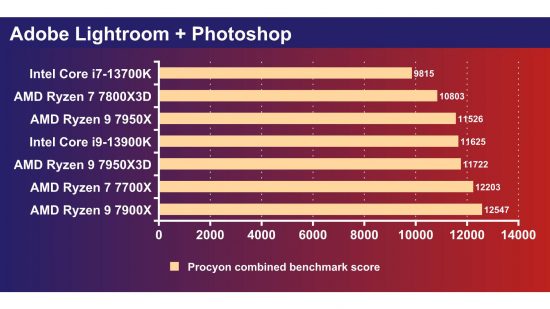
Ryzen 7 7800X3D Cinebench performance
Sadly, the Ryzen 7 7800X3D’s lack of frequency compared to the Ryzen 7 7700X does hurt it outside of games. Cinebench R23, for example, saw the 7800X3D achieve a multi-threaded score of 18,174, while the 7700X managed 20,030 and the similarly-priced Core i7-13700K hit a massive 30,137. The single-threaded Cinebench performance of the 7800X3D was poor too, with a score of 1,821 compared to 2,007 for the Ryzen 7 7700X and 2,099 for the Core i7-13700K.
The top-tier Ryzen 9 7950X3D proved its worth as a great all-rounder here, producing a score of 35,895 and nearly doubling the score of the Ryzen 7 7800X3D, making it a better choice for gamers that also dabble in serious amounts of content creation.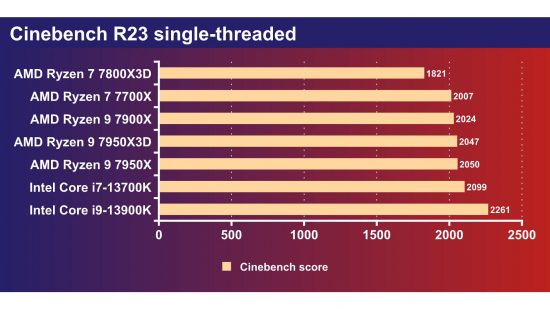
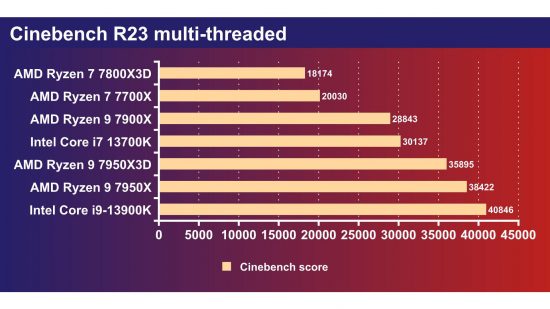
Ryzen 7 7800X3D Forza Horizon 5 frame rate
Whether running games at 1080p or 1440p, the Ryzen 7 7800X3D was utterly dominant in our tests, often dishing out faster frame rates than the Ryzen 9 7950X3D, thanks to its simpler layout and all of its cores having direct access to the 3D V-Cache.
In Forza Horizon 5 the Ryzen 7 7800X3D managed a minimum 99th percentile frame rate of 147fps at 1080p, which was 8fps ahead of the Ryzen 9 7950X3D, 10fps ahead of the Ryzen 7 7700X, and 16fps faster than the Core i9-13900K, with a similar advantage at 1440p.
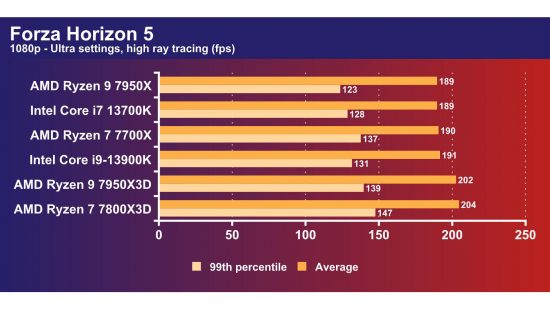
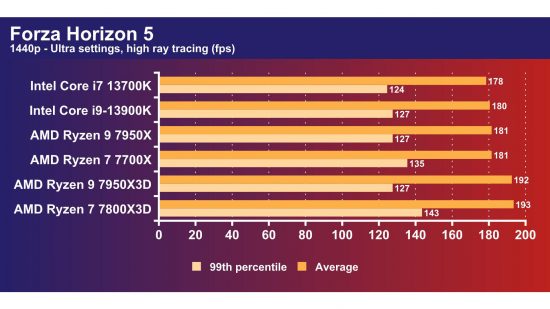
Ryzen 7 7800X3D Far Cry 6 frame rate
The Ryzen 7 7800X3D also produced a faster frame rate than the Core i7-13700K in Far Cry 6, with a good 8-10fps advantage. Its frame rate was once again noticeably quicker than that of the Ryzen 9 7950X3D, with similar situations at both 1080p and 1440p.
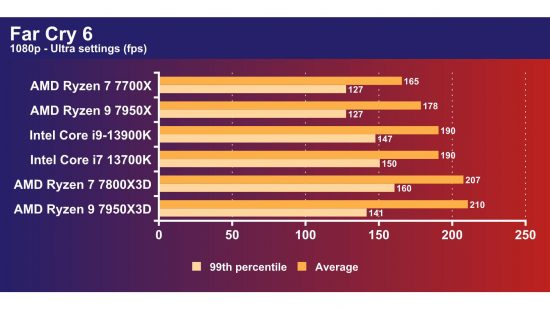
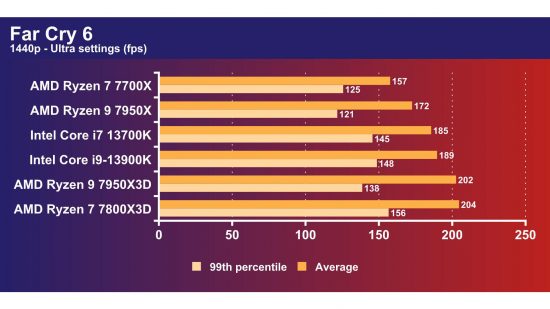
Ryzen 7 7800X3D Watch Dogs: Legion frame rate
There was a smaller frame rate gap between the Ryzen 7 7800X3D and other CPUs in Watch Dogs: Legion, but its advantage over the Ryzen 7 7700X was stark, with the 7800X3D producing a 99th percentile frame rate of 132fps at 1080p, compared to 109fps for the 7700X.
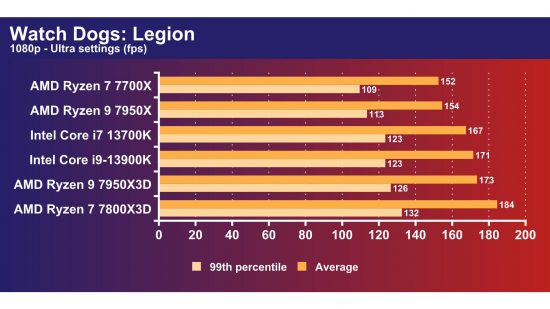
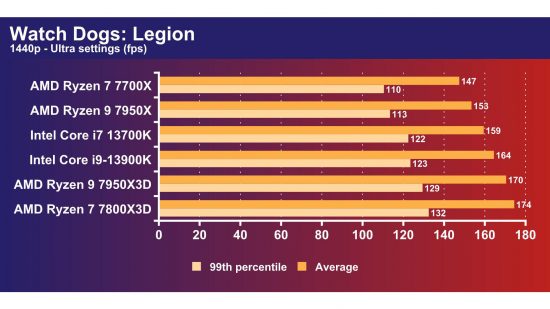
Ryzen 7 7800X3D power draw
The Ryzen 7 7800X3D power draw was perhaps its most stand-out result. Our Ryzen 7 7800X3D test system sucked less than 200W from the wall at load, which was barely more than a third of what we saw with the Core i9-13900K, 80W less than with the Ryzen 7 7700X, and 190W less than with the Core i7-13700K.
This makes it the most power-efficient gaming CPU out there, topping many performance charts, but drawing far less power than any other mid-range or high-end CPUs.
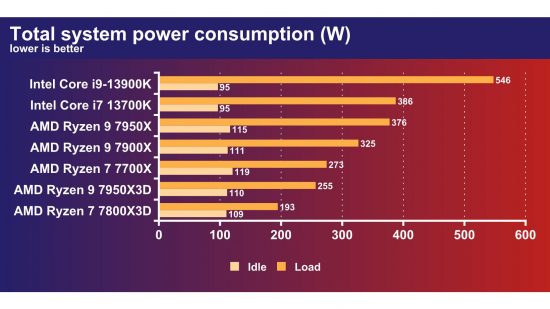
Ryzen 7 7800X3D boosting and temperatures
We saw the Ryzen 7 7800X3D hit its specified peak boost clock of 5GHz in games, while all-core boosting in multi-threaded workloads hit 4.8GHz. This is around 400MHz lower than the boost clock of the Ryzen 7 7700X, so it’s not surprising to see lower performance from the 7800X3D in multi-threaded benchmarks as a result.
Temperatures sat in the mid 80°C range with the Ryzen 7 7800X3D sitting under a custom water-cooling system, which is lower than the temperature of some other Ryzen 7000 CPUs, but not low enough to provide adequate thermal headroom for an all-core manual overclock.
This is usually the case with CPUs equipped with 3D V-Cache, and the older Ryzen 7 5800X3D was no different. If you want to play around here, your best bet is to get a little more involved with AMD’s curve optimizer, or use AMD’s Precision Boost Overdrive and Automatic Overclocking features. For more information, read our full guide on how to overclock AMD Ryzen 7000 CPUs.
AMD Ryzen 7 7800X3D pros and cons
Pros:
- Fantastic gaming performance
- Super-low power draw
- Only needs modest cooling
Cons:
- Expensive
- Poor performance outside of games
- Socket AM5 platform and DDR5 memory are pricier than other options
AMD Ryzen 7 7800X3D specs
The AMD Ryzen 7 7800X3D specs list is:
| Base frequency | 4.2 GHz |
| Max boost frequency | 5 GHz |
| Core | Zen 4 |
| Manufacturing process | 5 nm |
| Number of cores | 8 |
| Number of threads | 16 |
| IGP | AMD Radeon Graphics |
| L3 cache | 96 MB |
| L2 cache | 8 MB |
| Memory controller | Dual-channel DDR5, up to 5200MHz |
| Packaging | AMD Socket AM5 |
| Thermal design power (TDP) | 120 W |
| Simultaneous Multithreading (SMT) | Yes |
| Features | Precision Boost 2, AES, AMD-V, AVX, AVX2, AVX512, FMA3, MMX(+), SHA, SSE, SSE2, SSE3, SSE4.1, SSE4.2, SSE4A, SSSE3 |
AMD Ryzen 7 7800X3D price
The AMD Ryzen 7 7800X3D price is $449, making it poor value for anything other than gaming. However, its gaming performance is so good that it’s a decent value option if that’s your main focus.
Price: Expect to pay $449 (£429)
AMD Ryzen 7 7800X3D review conclusion
As a pure gaming CPU, the Ryzen 7 7800X3D is fantastic – it’s overall the fastest gaming CPU available, eclipsing the Core i9-13900K, Ryzen 9 7950X and Ryzen 9 7950X3D. It’s also easy to cool and extremely power frugal, despite topping game performance graphs.
With a modern mid-range or high-end gaming GPU, these gains are visible not just at 1080p but at 1440p too, so it’s particularly well-suited to gamers with high-end systems and high refresh rate monitors looking to maximize their frame rates.
It won’t be quicker than those other CPUs in all games, though, and similarly-priced or cheaper CPUs, such as the Core i7-13700K, Ryzen 9 7900X and Ryzen 7 7700X are much faster in content creation.
As a result, the above CPUs are much better allrounders while the Ryzen 9 7950X3D offers the best of both worlds, with double the cores and threads, but with a similar boost from 3D V-Cache. However, if you just want the fastest gaming CPU then AMD finally has the product to tempt hardcore gamers onto its new Socket AM5 platform.
In April 2023, reports emerged of the 7800X3D and other AMD 7000 series CPUs overheating and destroying themselves but this issue was quickly fixed so we don’t have any concerns continuing to recommend this CPU.
If you’re looking for other CPU options, our guide to the best gaming CPU details a range of different CPUs to suit different needs and budgets.
Curious to see how this processor runs when playing other games? Check out these CPU benchmarks over on the PCGameBenchmark FPS calculator.
